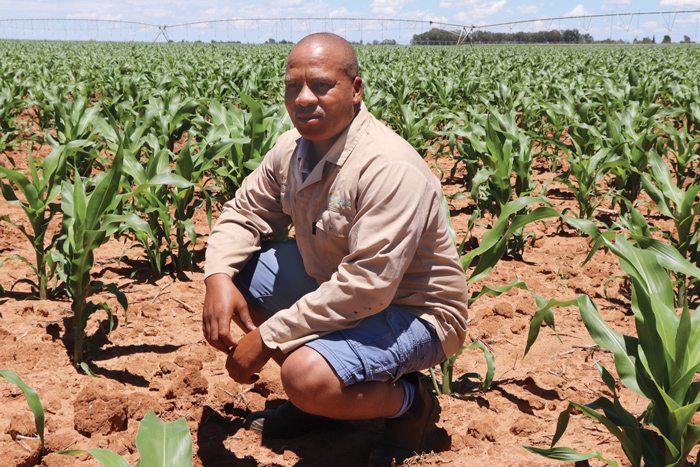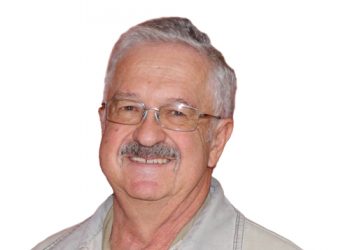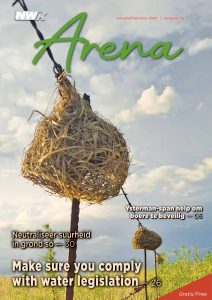
The 2023 New Era Commercial Farmer of Phahama Grain Phakama (PGP) – Grain SA’s Farmer Development Programme – was bestowed this title on his first try. However, it was only after many years of having tried, failed and finally succeeding as a farmer that William (Shimi) Raphoto (42) saw it fit to enter this prestigious competition.
Phahama Grain Phakama (PGP) members who produce more than 250 tons per annum could enter this category and William Raphoto was announced as the winner on 20 October last year.
He would be rejected by several companies where he had applied for work before he finally pursued farming full-time in 2005. William recalled the words of his late father, Rykie, who was also a long-standing member of PGP: ‘Government won’t give you a job, because you are a job creator yourself.’
Today, William is true to his calling (farming) and laughingly adds that it can also be a curse at times.
It runs in the family
Rykie started farming on trust land near Bethel in North West in 1992 and joined Grain SA in 2000. William had been helping his father on the farm ‘day in and day out’ since he was at school.
He obtained a qualification in animal health at the North-West University’s Mahikeng campus in 2003 and hopefully applied at several organisations for employment, but to no avail. Finally heeding his father’s advice, he too became a member of Grain SA in 2005 and started farming full-time.
Rykie obtained the farm Lareystryd near Itsoseng through a land reform project at the end of 2011. The father-and-son duo kept the trust land, where they were farming with maize, sunflower and some cattle, and expanded the farming operation by establishing more maize and sunflower on the 210 ha arable land of Lareystryd.
Having moved some of the cattle from the trust land to Lareystryd, William purchased a Simbra bull in 2021 and have since also introduced a Simmentaler bull to the herd to compare and improve genetics. ‘The Simbra is doing well. The Simmentaler appears to be heavy on food and cannot travel long distances to obtain it,’ he says.
He is also crossbreeding Dorpers with Ile de France. ‘Dorper lambs seem to grow slower than the Ile de France. Although the latter is smaller at birth, they grow faster and you can sell them quicker.’ His qualification in animal health is coming in handy, as he can diagnose and treat sick animals himself.
William is of the opinion that crops and livestock complement each other beautifully, as the latter provides valuable cashflow to pay workers and acquire inputs for grain farming.
Knowledge is power
Apart from being members of Grain SA and attending the tutoring programmes and courses presented by this organisation, William and his father were also participants of the Batswa ko Pele Project – an initiative by NWK back in 2007, which was aimed at uplifting and educating upcoming farmers.
William speaks fondly of his mentors at both PGP and NWK. Du Toit van der Westhuizen, regional development manager of Grain SA in North West, started working closely with William in 2012. ‘Du Toit really stood up when we needed him and didn’t hesitate to avail his equipment to us,’ William says.
He recalls the words of Jane McPherson, former programme manager of Farmer Development at Grain SA: ‘We may not be able to give you money and inputs, but we are giving you knowledge to sustain yourselves.’ He explains: ‘These words really gave me strong emotions. Grain SA did whatever they could to help us.’
William added that he was taught not to fear white farmers. ‘I am surrounded by white farmers who are all willing to assist. We exchange knowledge and borrow equipment from one another.’
He also values the lessons in financial management offered by Leonard Thaphathi, manager of Developing Agriculture at NWK, as well as the team at NWK Financing. ‘You manage yourself on the one end and they manage you on the other. You only get what you need and they assist you in managing yourself.’
The award is a token of appreciation
In 2023 William finally felt ready to enter PGP’s competition. ‘I started considering it in 2020, but only felt the timing was right in 2023. My records were not in good standard in 2022 and I managed to improve it significantly in one year.’
He says he entered the competition to thank PGP for accompanying him on this journey. ‘I’m better today because of PGP. It was a ‘thank you’ present to them.’
He thanked his mother, Welhelmina Raphoto, as well as his sisters, Kgotlello Roda and Matshidiso Raphoto, for their support on his journey. ‘I am also very grateful towards my workers for their dedication and hard work.’
William would like to acquire more land of his own but wants to partner with someone along the way. ‘If you are alone and you fall, there is nobody with you,’ he explains. ‘Alone I am nothing. I want somebody who has the same view as me about the way forward.’
He also hopes to be more consistent in producing better genetics among his animals. Apart from theft, William views climate change as a significant threat to his farming operation. ‘You must preserve moisture in the soil as far as possible and prepare the soil straight after harvesting. This way, if you receive rain late like we did this season, you can immediately plant once it falls.’
He mitigated the risk caused by the late rains by planting more sunflower (210 ha) than maize (about 200 ha). He also planted 70 ha soybeans.
He advises other farmers to always be willing to improve, make mistakes and learn from them. ‘You must know where you want to go. Be there, be on the farm! Don’t be shy to ask for help and join those with experience.’
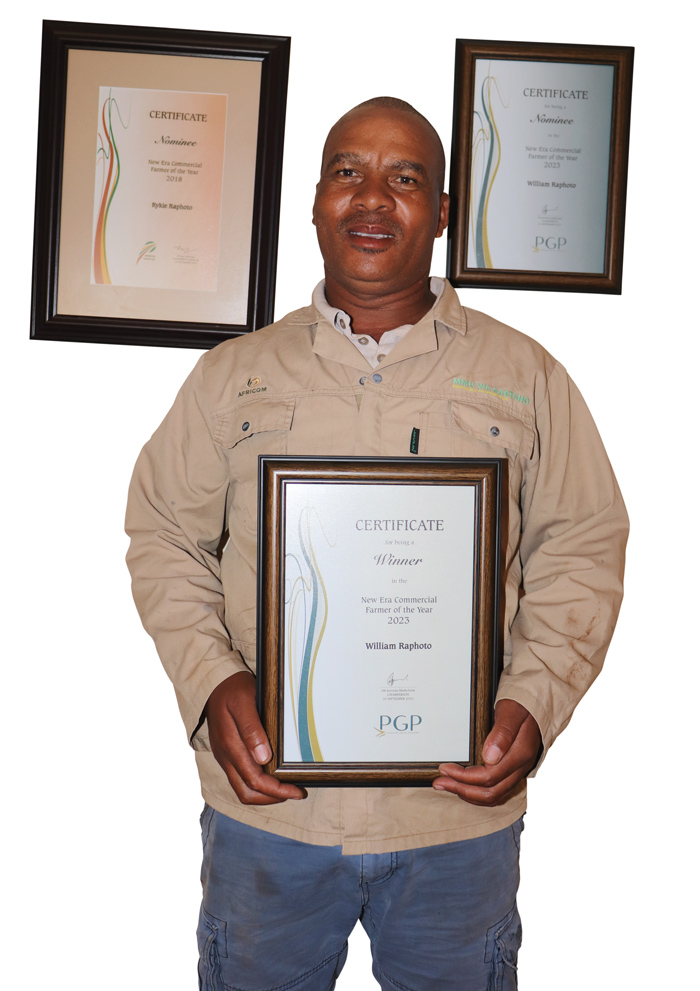
Mentor’s impressions
‘William (Shimi) has always shown potential, especially while farming in a communal area despite the challenges it brings. In 2012 he managed 2 t/ha to 3 t/ha yields with maize and last year he harvested more than 5 t/ha.
‘This can be attributed to his good soil management. He is willing to learn and uses modern cultivation practices. He also contracts out some of his implements, which assists with the cashflow.
‘He is actively participating in groups aimed at combatting theft and is always willing to reach out to a neighbour in need,’ Du Toit said.
‘Shimi’s farming enterprise stands out as truly commendable, characterised by a harmonious blend of effective financial management and conscientious land care. His dedication to sound financial management is evident through meticulous budgeting, well-calculated investment decisions and a keen awareness of prevailing market trends.
‘He not only optimises resources efficiently, but also embraces responsible farming practices, ensuring that the land remains viable for future generations. With a vision for the future, Shimi aspires to elevate his farming business into a sustainable commercial unit.
‘This is reflected in his careful strategic approach to expanding operations while safeguarding the farm’s sustainability. He envisions a legacy for his children, mirroring his own inheritance from his father, and is committed to preserving the farm for the next generation.
‘His unwavering commitment to both financial prudence and sustainable farming positions him as a deserving candidate for recognition as a PGP New Era Commercial Farmer,’ Leonard added.
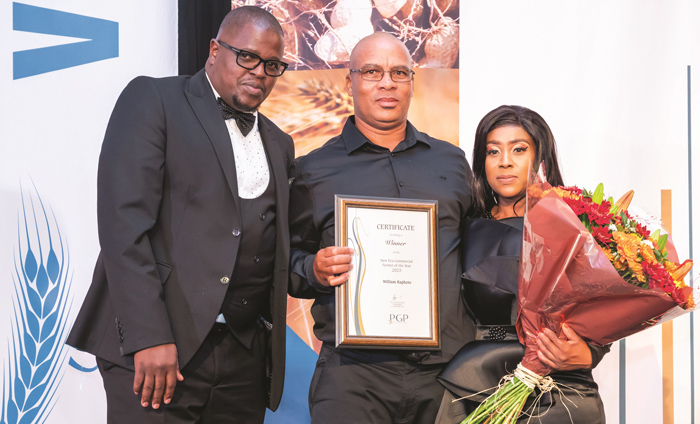
(Photo: Grain SA)
More about PGP
- At the 2020 Grain SA Congress the decision was taken to move the Farmer Development Programme from Grain SA to a non-profit company called Phahama Grain Phakama (PGP).
- It has been registered with SARS in terms of section 18A of the Income Tax Act as a Public Benefit Organisation. One of the prerequisites from SARS, was that it was important to distinguish between Grain SA NPO and Phahama Grain Phakama NPC as two entities.
- The goal of PGP remains the same – to develop farmers. It will now just be structured in a company format.
- The name basically means ‘stand up, maize, rise, grow’ and is symbolic of the growth needed in the number of new era commercial producers in South Africa to ensure food security.



